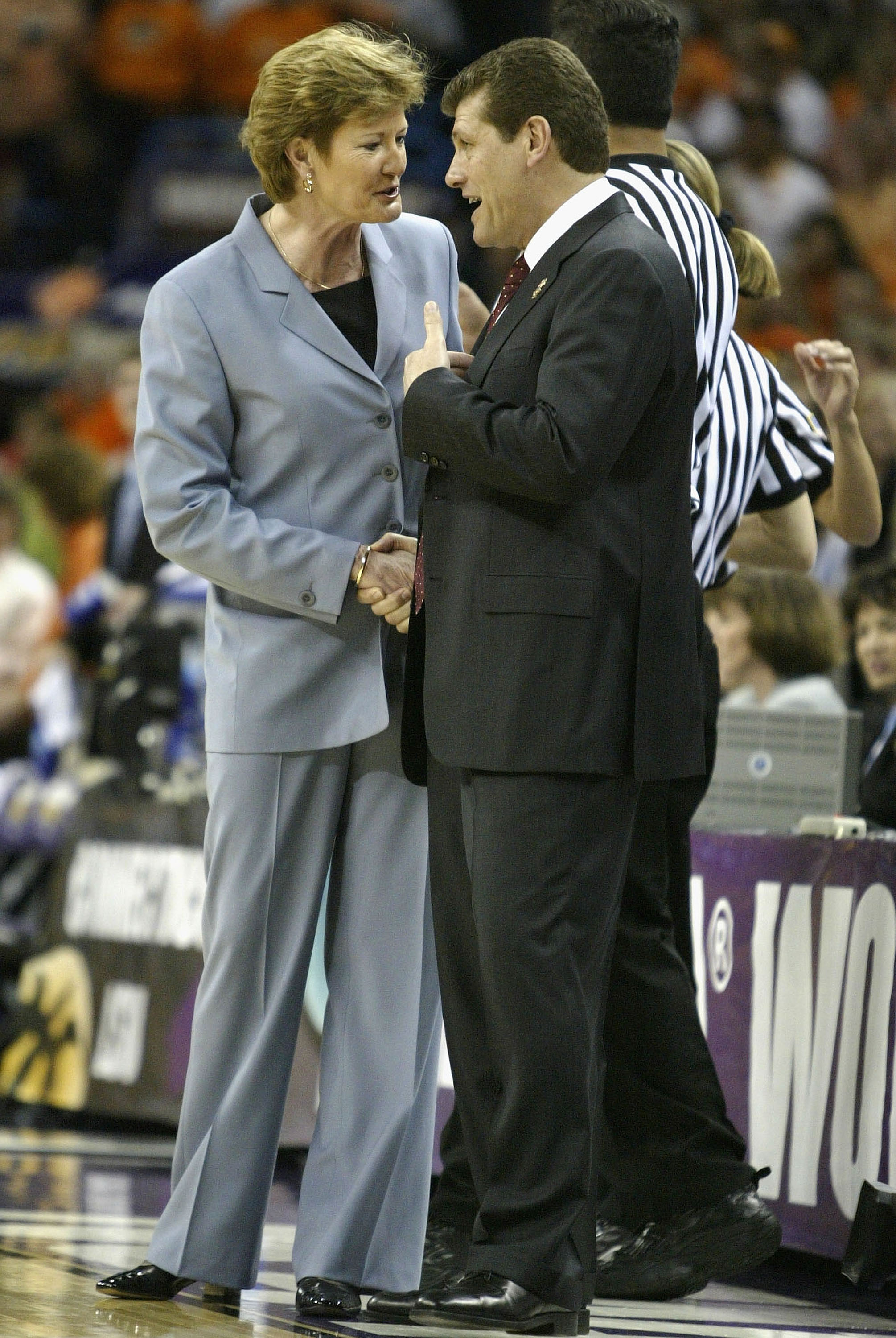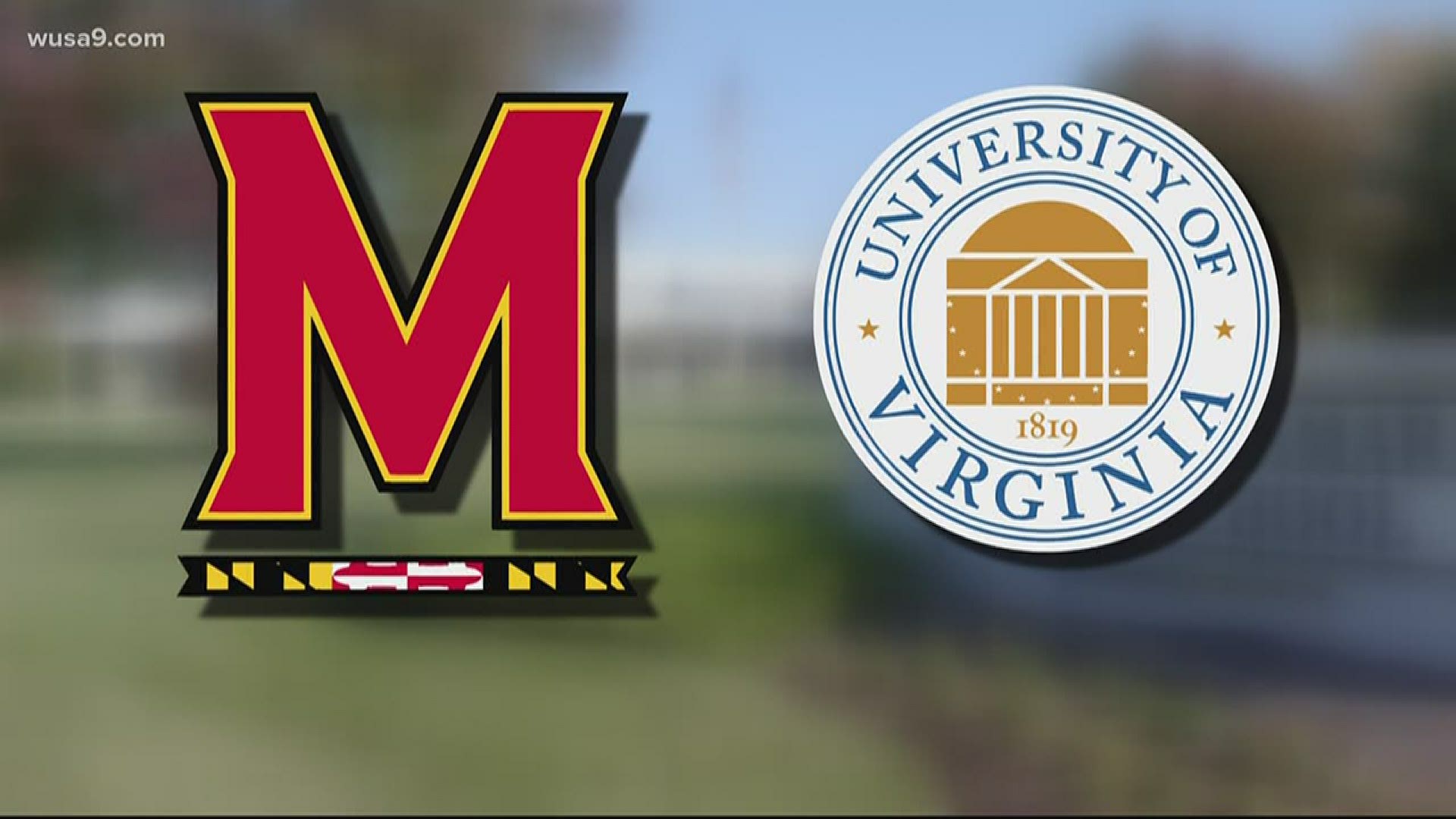It is the privilege of posterity to set matters right between those antagonists who, by their rivalry for greatness, divided a whole age. — Joseph Addison
They’ll fill an arena for Pat Summitt one last time at the University of Tennessee next week. If Geno Auriemma can’t make it, leave a symbolic seat open for him. Her story isn’t complete without his.
They weren’t friends. They were more than that: The yin and yang, or North and South, of women’s college basketball — contrary yet complementary forces of nature who animated the game as it came of age in Title IX America.
Joseph Addison was a British poet, playwright and politician who lived more than 300 years ago, when sport meant cricket, boxing or golf. He knew nothing of basketball, let alone the alien notion of women as athletes. But Addison knew all about the clash of egos that are inevitable at the summit of achievement, no matter the field. Or court.
Summitt Court in UT’s Thompson-Boling Arena will be the setting for a public memorial celebration for Summitt, who died last month at 64 after a years-long struggle with early-onset dementia, Alzheimer’s type. It’s where she won so many of her 1,098 victories, more than any other major college basketball coach, man or woman.
Auriemma is not far behind, with 955 victories. The University of Connecticut coach has 11 national championships, surpassing Summitt’s eight with her Lady Vols. But Auriemma understands full well there’s one place he can’t exceed her, no matter how many more titles his Huskies may win: She got there first, creating a dynasty in her own image while setting a standard of unerring excellence and laser-eyed focus.
“One would be hard-pressed to name a figure who had a more indelible impact on her profession than Pat Summitt,” Auriemma said in a statement when she died. “Pat set the standard for which programs like ours dreamed of achieving, both on and off the court. Our sport reached new heights thanks to her success.”
Auriemma’s Huskies dreamed those dreams — and, when they achieved dynastic heights of their own, Summitt and Auriemma naturally clashed as bitter rivals striving for an annual prize only one could have. Great rivalries beget even greater greatness. Think Muhammad Ali vs. Joe Frazier, Magic Johnson vs. Larry Bird, Martina Navratilova vs. Chris Evert, Jack Nicklaus vs. Arnold Palmer.
Olympian rivals Michael Phelps and Ryan Lochte will trade water-churning strokes one last time next month in Rio. Phelps edged Lochte in the 200-meter individual medley at the U.S. trials last week and told reporters: “I don’t know of another person in this world who brings out the best in me like he does.”
Rivalry can also bring out the worst. The ferocious blows Ali and Frazier rained down on one another were never below the belt, but their words often were. Ali called Frazier an Uncle Tom. Frazier mocked Ali’s Muslim faith.
The cold years
Auriemma and Summitt traded barbs on a lesser scale by many multiples. He called her the Evil Empire. She called him paranoid. And in the end, the games stopped.
The Huskies and Lady Vols memorably met 22 times in 12 years, beginning in 1995. UConn won 13 of those games to Tennessee’s nine. The shame is that the marquee series ceased in a sport that sorely needs its marquee moments. Tennessee sent a formal letter to the SEC in 2006 alleging a pattern of recruiting violations at UConn; Tennessee announced in 2007 it was ending the series. Summitt didn’t publicly say why. Auriemma suggested a reason: “She hates my guts.”
Auriemma said in 2008 that he was sick of answering questions about recruiting. “The NCAA would have come down hard on us, which they didn’t,” if there were anything to it, he said.
Weeks later, Auriemma added: “She accused us of cheating. She just doesn’t have the courage to say it publicly.”
Summitt declined comment on that. But at SEC Media Days in 2010, in answering a broad question about recruiting, she said: “I’ve never compromised at all and I wouldn’t. And if I did, they should fire me.”
Bruce Pearl, then Tennessee’s men’s coach, was embroiled in a recruiting scandal of his own at the time. Asked for clarification by a local sports radio station, Summitt said: “I didn’t have Bruce Pearl on my mind. I probably had Connecticut on my mind. There’s a reason we don’t play them.”
From different worlds
Dick Patrick covered women’s college basketball for USA TODAY Sports during much of the rivalry’s run. He thinks the rift rested mostly on competition for titles and recruits, but figures their strong personalities contributed to it. Auriemma was born in Italy and emigrated at 7; he grew up in suburban Philadelphia. Summitt was born in Clarksville, Tenn., where she was buried last week; she grew up on a family farm.
“Geno was a wise-ass from Norristown, an immigrant who assimilated through sports and humor,” Patrick says. “Pat was a daughter of the South. Geno wasn’t gentlemanly enough for her at times.”
Summitt comes close to making that point in her 2013 book, Sum It Up: A Thousand and Ninety-Eight Victories, a Couple of Irrelevant Losses, and a Life in Perspective, written with Sally Jenkins. “Geno always liked to make barbed remarks, but it seemed to me that from 2000 on, they had an ungenerous edge,” Summitt wrote. “Oddly, the more success UConn had, the more Geno resented Tennessee.”
Patrick once asked Auriemma about Summitt consulting on motion offense with Villanova coach Harry Perretta, an old pal of Auriemma’s. “Harry left me for an older woman,” Auriemma quipped.
Summitt cited that remark in Sum It Up and wrote: “I shot back. ‘I agree Geno is jealous,’ I said. ‘You could also put paranoid in there.’ ”
At the 2000 Final Four in Philadelphia, Auriemma cracked wise about Pat’s and Geno’s, rival cheesesteak joints in Philly. “Pat’s is older and more dilapidated,” he said. “Geno’s is bigger and brand new.”
Summitt was just 21 months older than Auriemma. Revelry and rivalry don’t mix when gibes cut close to the bone.
But respect remained. Auriemma was among the first to donate to the Pat Summitt Foundation to fight Alzheimer's. "He wrote out a check on the spot — for $10,000," Summitt wrote in her book.
A daughter’s gesture
The first known use of the word rival harkens to the 1570s, Merriam-Webster says — or roughly 100 years before Addison was born. The root word in Latin is rivus, meaning brook. Rival originally meant “one who uses the same stream,” raising the notion of neighbors at odds over water rights, a traditional point of strife for humankind — as crucial to life as is recruiting to college sports.
Addison in that opening quote cites posterity, meaning future generations. Auriemma’s daughter Alysa took a first step in setting matters right in 2012 after Summitt retired as coach at Tennessee, a year after she went public with her diagnosis.
Alysa wrote a heartwarming blog entry in which she told of being 11 when UConn beat Tennessee in the 1995 national championship game. Her father had told Summitt that his daughter thought Tennessee looked like a wonderful place to go to college based on the Lady Vols’ media guide. Summitt rewarded the compliment with a phone message some months later.
“I thought Dad would garrote me,” Alysa wrote. “I felt guilty that she called me. I mean, this was Pat Summitt! Tennessee! The supposed antithesis of everything we were at the University of Connecticut, our ‘mortal enemy,’ was on my answering machine, addressing me by name, saying in a quite cheerful voice, ‘I hear you like orange!’ Benedict Arnold didn't have anything on me. I began picturing my funeral.”
Summitt’s funeral came much too soon, for a rivalry and a nation. The celebration of her life on July 14 will likely include warm stories about an iron-willed coach who changed the course of American sports history with her fierce competitiveness and canny program building. Maybe there’ll be mention of Geno amid X-and-O memories. Maybe not.
Either way, Alysa’s blog asserted too much is made of a falling out between giants — and not enough about their bond as best of the best:
“How dare you, newspeople and sportscasters and the whole lot of you, make this about an isolated incident that is merely a footnote in the epic, a stone in the glass slipper, a crack in the Yellow Brick Road?”
Contributing: The Knoxville News Sentinel, part of the USA TODAY Network.


